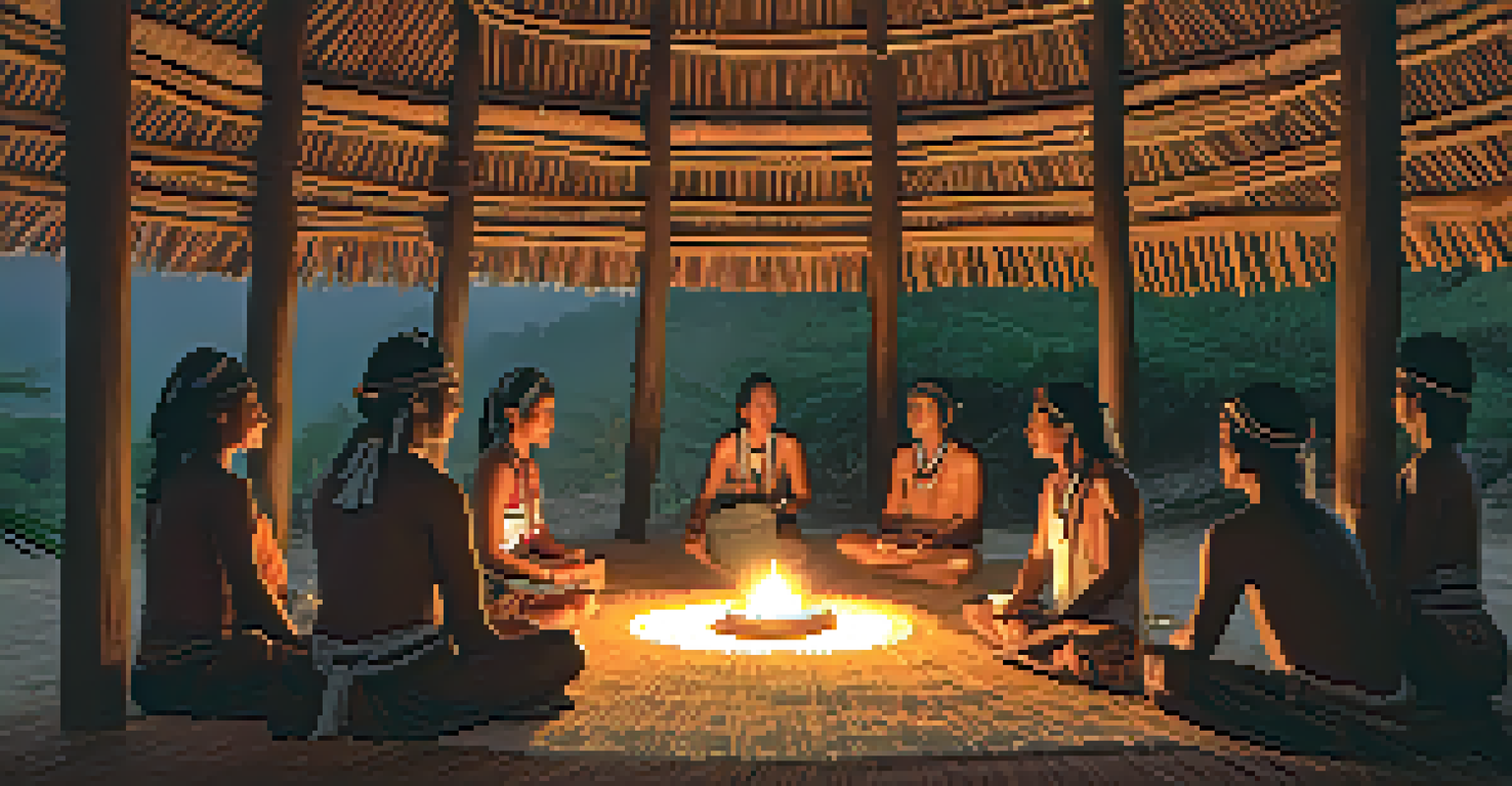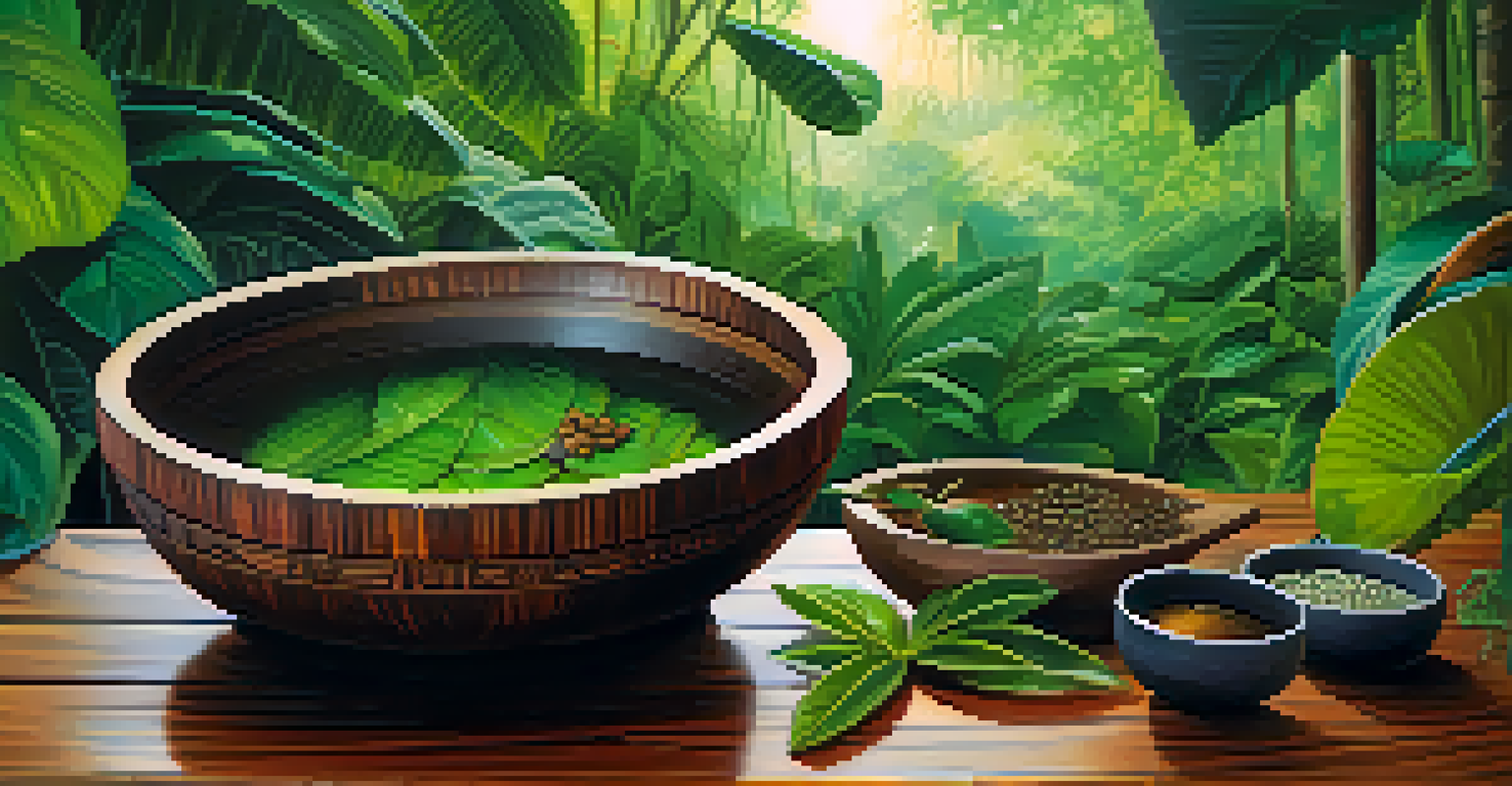The Influence of Shamanism on Ayahuasca's Global Popularity

Understanding Shamanism and Its Practices
Shamanism is an ancient spiritual practice found in various cultures around the world, often involving a shaman or healer who connects with the spiritual realm. These practitioners use rituals, music, and sometimes psychoactive plants to facilitate healing and guidance for their community. At its core, shamanism emphasizes a deep connection with nature and the spirit world, making it a rich context for the use of substances like Ayahuasca.
Shamanism teaches us that the healing of the soul is a journey of self-discovery, connecting us to the wisdom of nature and the spirit world.
In many indigenous cultures, shamans serve as intermediaries, helping individuals navigate personal and communal challenges through spiritual journeys. This connection to the unseen world provides a framework for understanding the purpose of Ayahuasca, which is traditionally used in ceremonies to promote healing and self-discovery. The rituals surrounding Ayahuasca involve careful preparation, intention setting, and a supportive environment, all hallmarks of shamanistic practice.
As Ayahuasca's popularity has grown globally, so has interest in the shamanistic traditions that underpin its use. This increased awareness invites people from various backgrounds to explore the spiritual insights Ayahuasca can offer, drawing them into the world of shamanism even if they are not part of the original cultures.
Ayahuasca: A Brief Overview and Its Origins
Ayahuasca is a potent brew made from the Banisteriopsis caapi vine and other plants, primarily the chacruna leaves, which contain the psychedelic compound DMT. Indigenous Amazonian tribes have been using this combination for centuries, not just for spiritual and healing purposes but also to connect with their ancestors and the natural world. Its use in communal ceremonies serves to strengthen social bonds and cultural identity.

The experience of consuming Ayahuasca is often described as a profound journey into the self, revealing insights and emotions that might otherwise remain hidden. This introspective nature of the Ayahuasca experience aligns closely with shamanic practices, where the aim is to facilitate healing and personal growth. As people seek out Ayahuasca for these transformative experiences, they often find themselves drawn into the rich tapestry of shamanic traditions.
Shamanism's Role in Healing
Shamanism emphasizes deep connections with nature and the spirit world, using rituals and substances like Ayahuasca for healing and guidance.
In recent years, Ayahuasca has transcended its geographical and cultural boundaries, attracting individuals from around the globe who are curious about its potential benefits. This international interest has led to the establishment of Ayahuasca retreats, where participants can engage in guided ceremonies led by experienced shamans, bringing shamanism into a more modern context.
The Global Rise of Ayahuasca Tourism
Ayahuasca tourism has surged over the past two decades, with travelers flocking to South America to partake in traditional ceremonies. This phenomenon has created a unique blend of cultural exchange, where Western seekers engage with indigenous practices. While this can foster appreciation for shamanic traditions, it also raises concerns about cultural appropriation and the commercialization of sacred practices.
The experience of Ayahuasca is not just about the substance; it’s about the transformative journey it invites us to undertake.
Many retreat centers aim to provide authentic experiences, often employing native shamans to conduct ceremonies. This not only preserves the integrity of these ancient practices but also offers participants an immersive journey into the spiritual traditions of the Amazon. However, the influx of tourists has also led to a burgeoning industry that sometimes prioritizes profit over authenticity, sparking debates within the community.
As Ayahuasca tourism continues to grow, the influence of shamanism remains a critical component of its appeal. Participants are often drawn not just to the substance itself, but to the transformative experiences that come from deepening their understanding of both themselves and the shamanic traditions they are engaging with.
Cultural Exchange: Shamanism Meets Modern Wellness
The intersection of shamanism and modern wellness trends has created a unique landscape for Ayahuasca's popularity. As wellness culture embraces holistic approaches to mental health and self-discovery, many individuals are turning to Ayahuasca as a means of exploring their consciousness. This shift reflects a growing desire for alternative therapies that complement conventional medicine.
Shamanic practices offer tools for healing that resonate with contemporary seekers, such as meditation, mindfulness, and community support. When combined with the Ayahuasca experience, these elements can lead to profound personal insights and emotional healing. People often share stories of how their Ayahuasca journeys have helped them confront trauma, manage anxiety, or find purpose in their lives.
Ayahuasca's Global Appeal
The rise of Ayahuasca tourism has led to a cultural exchange, where individuals seek transformative experiences while engaging with indigenous practices.
This blending of ancient wisdom with modern therapeutic practices highlights the adaptability of shamanism and its relevance in today's society. As more individuals seek meaning and connection, the influence of shamanic traditions on Ayahuasca's global appeal continues to grow.
Challenges and Ethical Considerations in Ayahuasca Use
As Ayahuasca gains popularity, it brings with it a host of ethical challenges and considerations. For instance, the potential for exploitation of indigenous knowledge and traditions is a significant concern. Many shamans have reported feeling overwhelmed by the influx of tourists and the pressure to commodify their practices, which can dilute the spiritual significance of their work.
Additionally, there are health risks associated with Ayahuasca use, especially for individuals with certain medical conditions or those taking specific medications. Safety and preparation are crucial, highlighting the need for responsible practices both within retreat settings and among individuals seeking to embark on their Ayahuasca journey. It’s essential that participants approach this experience with awareness and respect for the traditions they are engaging with.
Navigating these challenges requires a delicate balance between honoring the roots of shamanism and adapting to modern contexts. Engaging in open dialogue and fostering genuine relationships between participants and indigenous communities can help mitigate some of these ethical concerns, ensuring that Ayahuasca remains a tool for healing rather than exploitation.
The Spiritual Insights Offered by Ayahuasca
Many participants report transformative spiritual experiences during Ayahuasca ceremonies, often describing them as life-changing. These insights can range from profound realizations about one's life purpose to feelings of interconnectedness with all living beings. This spiritual aspect is deeply rooted in shamanistic practices, where the goal is to connect with the divine and understand one's place in the universe.
Shamans often guide participants through these journeys, helping them navigate the sometimes challenging emotional landscapes that arise during the experience. This support is crucial, as Ayahuasca can bring up intense feelings and memories that require careful processing. The role of the shaman in this context is not just as a facilitator but as a spiritual guide, helping individuals find meaning in their experiences.
Ethical Concerns in Ayahuasca Use
As Ayahuasca's popularity grows, ethical challenges arise regarding the exploitation of indigenous traditions and the health risks associated with its use.
As people return from their journeys, they often carry these spiritual insights into their everyday lives, leading to changes in perspective, behavior, and relationships. This ripple effect emphasizes the enduring influence of shamanism on the global popularity of Ayahuasca, as seekers continue to explore the depths of their souls.
Embracing the Future of Ayahuasca and Shamanism
Looking ahead, the future of Ayahuasca and its relationship with shamanism is both exciting and complex. As global interest continues to rise, there is a potential for deeper understanding and appreciation of indigenous cultures and their practices. This could lead to more collaborations between shamans and modern wellness practitioners, enriching both communities.
However, it is essential to approach this future with sensitivity and respect. The commodification of Ayahuasca must be navigated carefully to ensure that the spiritual traditions are preserved and honored. Engaging with indigenous voices and prioritizing ethical practices will be vital in shaping the future landscape of Ayahuasca use.

Ultimately, the journey of Ayahuasca is a shared one, where the wisdom of shamanism can guide seekers toward deeper understanding and connection. By embracing this dialogue and fostering respectful relationships, we can ensure that the influence of shamanism continues to resonate within the global popularity of Ayahuasca for generations to come.